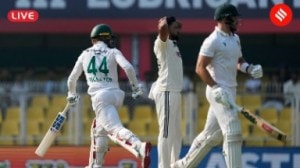Class Act — College managements seek more clout
MARCH 12: Never mind the minister's protestations. Never mind the curtain of silence that rings the proposed amendments to the Maharashtra...

MARCH 12: Never mind the minister’s protestations. Never mind the curtain of silence that rings the proposed amendments to the Maharashtra Universities Act, 1994. And academicians can cry blue murder but with the state government seemingly ranged on their side, college managements could eventually have their way after months of hankering for a greater say in crucial administrative matters in each of the eight universities in the state.
Moreover, the March 4 ordinance abruptly staying elections in universities across the state — they are held once every five years — clearly betrays the government’s intention to humour this powerful lobby at the earliest.
The vehicle that will power college managements into the nitty-gritty of the university’s functioning, sources say, is an enhanced quota of seats in crucial university bodies which can be effected only once the act is amended.
Minister for Higher and Technical Education Dilip Valse-Patil, however, refuses to divulge details, preferring to take refuge in generalities instead. “The decision to suspend the elections was a well thought-out one following our continous talks with teachers, principals, managements… everyone. If we do not suspend the elections now to carry on our amendment proposals, we shall not be able to do so in the next five years,” was all Valse-Patil was willing to say. He dogdes every query on the intentions behind the amendments.
Sources explain that the elections would not have been stayed had fundamental changes in the act not been contemplated. These clearly relate to the composition of university bodoes like the all-important Senate, Management Council, Academic Council and the like.
President of the Maharashtra Federation of University and College Teachers Organisation (MFUCTO), C R Sadashivan, says the genesis of the move can be traced to two seminars, in January and February, organised by college managements affiliated to the University of Pune. Both seminars, which were attended by the minister, discussed representation of college managements in various university bodies.
Sadashivan says both seminars had discussed how principals and teachers should not be the main governing strength of colleges and universities. They are merely employees, it was said. Instead, managements should be conferred with greater powers.
The Senate is the highest decision-making body in every university. This committee, which holds the university’ purse strings, currently comprises 92 members. Five of them are management representatives, who are elected members. The Maharashtra Universities Act, 1994, could therefore be amended to increase the quota to include more management representatives.
In contrast, the 18-member Management Council has only one seat in the general category representing graduates and college managements and which is filled via an election. To increase the number of management representatives, a reserved quota will have to be created via an amendment.
The Academic Council, among other things, decides on the crucial matter of college affiliation, which could be conferred for varying periods of time. It also decides on the courses colleges are permitted to include in their curriculum. This, sources explain, can be manipulated to include courses that may suit the college managements’ agenda.
The seven-member Standing Committee, which mainly takes decisions on filling the posts of these university bodies, comprises three members from the Senate, two from the Management Council and two from the Academic Council. Enhancing the representation to college managements to any of these three panels will automatically influence decision-making by the Standing Committee. With most colleges in the state being private-run, the clout managements enjoy is therefore vital.
The Grievance Committee, which comprises six members, four of which are nominated by the Management Council, by definition considers grievances against college managements. The advantages of creating a reserved quota in the Management Council for this lobby are obvious.
Quoting from the Maharashtra Universities Act, 1994, Sadashivan says: “One of the objectives of the present act is to take measures to curb or eradicate undesirable non-academic influences detrimental to maintaining discipline and standards of education or academic excellence in the university’.” He says this is precisely why the Maharashtra Universities Act had reduced the number of management representatives in the Senate to just five. The earlier, Maharashtra Act no. XXII of 1974), had provided for one-third the number of college managements, which amounted to approximately 50 in Mumbai. The amendments proposed at present will now seek to reverse this trend, he points out.
Repeatedly denying the government’s tilt towards college managements, Valse-Patil says that if he attended two seminars by managements, he had also attended one organised by principals at Amravati. However, his empathy for college managements is all too evident. He asks: “When management representatives do not have a seat in the MC, don’t you think that is not fair?”
Remarks Senate member, University of Mumbai, Amarjit Singh Manhas: “There is no need for an increase in management representation as principals’ representatives are adequately present in all university bodies. Moreover, the act in its present form considers principals as representatives of managements.”
MFUCTO has already voiced its protest to Valse-Patil on the suspension of the elections. They have also instructed all Senate members to vent their opposition during the next Senate meeting, scheduled for March 17.
The Akhil Bharatiya Vidyarthi Parishad (ABVP), which had organised a seminar on the act last year, is equally peeved. “It is wrong to stop the elections to the various university bodies,” says ABVP spokesperson Rajesh Dabholkar, adding that they plan to move court.



- 01
- 02
- 03
- 04
- 05




























